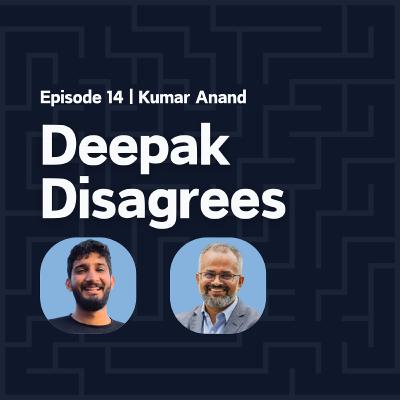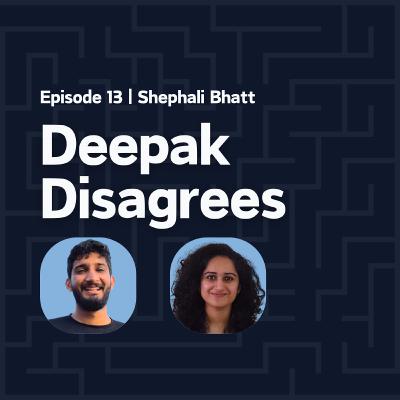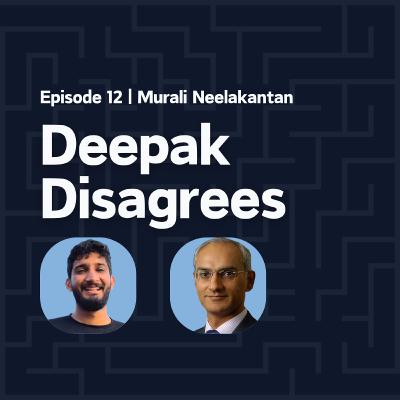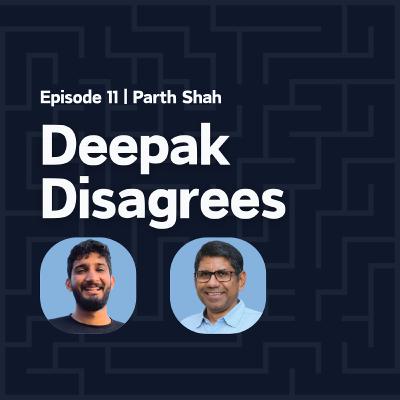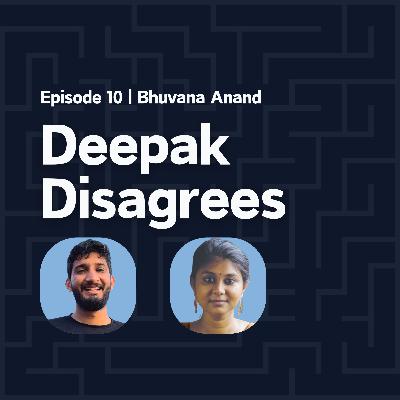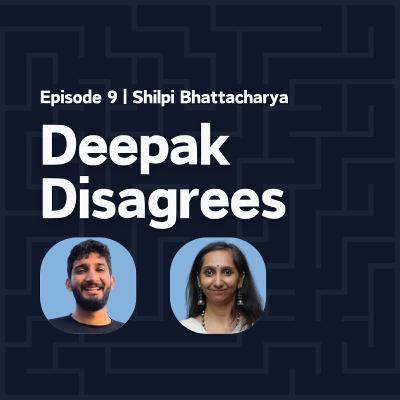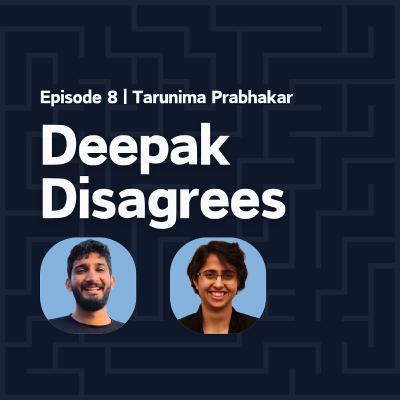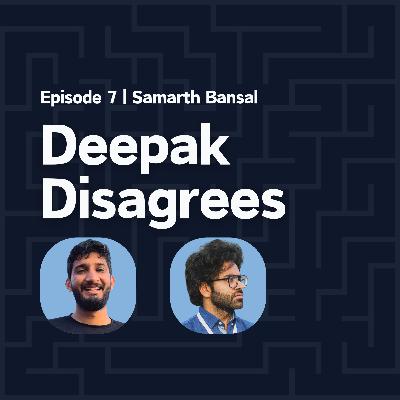Discover Deepak Disagrees
Deepak Disagrees

16 Episodes
Reverse
Pranay believes that nationalism is not only unavoidable, but unfairly criticised by liberals and libertarians.But what exactly is a nation? Isn't nationalism often linked with violence and exclusion? And is it fair to say that liberals aren't nationalists?Pranay Kotasthane is the Deputy Director of the Takshashila Institution, where he also leads the High Tech Geopolitics programme.He co-hosts the Puliyabaazi podcast, and authors the Anticipating the Unintended newsletter. He’s also co-authored several widely read books on public policy, including Missing in Action, When the Chips Are Down, and We, the Citizens.Episode notes
Ajay Shah believes that global free trade is good, and that state autarky is a bad idea. Borders, he says, should be relatively open, and there should be low levels of control on people, goods, services and capital moving across borders. But what does openness really mean? Can controls on individual liberties ever justified? And what about bad actors like China? Ajay is one of India's most prominent economists, the co-founder of the XKDR Forum, and co-author of the widely-acclaimed In Service of the Republic. His work spans financial markets, public finance, state capacity, and economic reform in India.Episode notes
Kumar Anand believes that more liberty is always better than less liberty. As a libertarian, he argues that many problems can be traced back to too much state power and too little individual freedom.But what is liberty? Is it possible without coercion? And why is trading liberty for security a bad idea?Kumar is an economist at the Centre for Civil Society, one of India’s leading market-liberal think tanks. His work spans public choice, regulatory reform, school choice, and urban governance. Episode notes
Shephali Bhatt argues that we cannot, and should not, separate art from the artist. To her, art is not created in a vacuum. It is an extension of the artist.But should art always be judged by its creator’s character? Can something deeply moving still be pure, even if its creator is not? And does this enrich or corrupt our appreciation of art?Shefali is an award-winning journalist with an expansive career spanning The Economic Times, Mint, The Times of India, and Hindustan Times. Her work explores culture, media, identity, and ethics.Episode notes
Murali Neelakantan says we simply cannot allow people to suffer because they are unable afford a drug that already exists. He argues that India must make healthcare free, universal, and funded by the state acting as a benevolent monopsonist.But what is healthcare? Why should we not bet on private interests to solve this problem? And does the state's interference do more harm than good?Murali is a lawyer with an expansive career spanning decades in corporate law. He has been a long-time voice in India’s healthcare policy debate, working as global general counsel for both Cipla and Glenkark Pharmaceuticals. Episode notes
Parth Shah argues that part of the unraveling of globalized, liberal democracies is the way political parties themselves are designed. If parties are the central lever of democratic life, should they not also be internally democratic? He asks: Why do institutions that thrive on command-and-control end up running societies that are meant to be free?Parth is the founder and president of the Centre for Civil Society, one of India’s leading liberal think tanks, and currently serves as Dean of the Indian School of Public Policy. His career has spanned academia, policy advocacy, and institution-building.Before founding CCS, Parth taught economics at JNU and the University of Michigan.Episode notes
Bhuvana Anand believes that libertarians fall short of maximizing human flourishing because their worldview lacks space for coercion. But who gets to decide what the “right” kind of coercion looks like? Should society be trusted more than the state to enforce it? And why did a longtime liberal-libertarian find herself increasingly drawn to conservative ideas?Bhuvana is the Director and co-founder of Prosperiti, a public policy think tank that works with state governments to identify and implement economic reforms. Their work spans issues like labour regulation, land use reform, and institutional accountability.She has previously worked across government, civil society, and international development, including stints with the United Nations and various ministries in India.Episode notes
Dr. Shilpi Bhattacharya believes monopolies are a problem and competition regulation is essential. But what exactly makes monopolies harmful? Isn't state interference worse? And doesn't regulation just kill innovation?Shilpi is a professor at Jindal Global Law School, where she teaches and researches Competition Law and Digital Markets. She holds a PhD in the field and has also worked at a law firm in Singapore before moving into academia.Episode notes
Tarunima Prabhakar believes that scraping publicly available data should be not just permitted, but actively defended. But what counts as "public"? Is scraping an act of theft? And how should researchers, platforms, and policymakers navigate these blurry lines?Tarunima is the co-founder and Executive Director of Tattle, a civic tech organization tackling misinformation on the internet. She has a strong background in computer science, public policy, and public interest technology.Episode notes
Samarth Bansal is a journalist and writer. He is the founder and editor-in-chief of The Plank, a new magazine dedicated to truth-seeking journalism for curious citizens. But what does it mean for something to be true? Is there such a thing as an unbiased journalist? And how do we separate fact from fiction? Episode notes
Shambhavi Naik believes gene editing in children should remain unregulated beyond ensuring safety and compliance with existing laws. But what does "safe" mean? Where do we draw the line between therapy and enhancement? And what if someone goes rogue?Shambhavi is the Head of Research at Takshashila and chairs its Advanced Biology programme. A PhD in Cancer Biology, she has contributed to WHO guidelines on gene editing, India’s risk assessment of genetically modified crops, and the Rajya Sabha Parliamentary Committee’s work on the DNA Profiling Bill.Episode notes
Amit Varma believes the relationship between the state and society should be rooted in the classical liberal contention of rights. But why does he believe this? Why not prefer anarchy? And most importantly—why should you own yourself?Amit is a celebrated journalist, podcaster, and two-time Bastiat Prize winner. Through his writings and his iconic podcast, The Seen and the Unseen, he has spent decades making the case for liberty and individual rights.Episode notes
Anupam Manur believes price controls are a recipe for disaster. But is he overlooking the potential benefits? Can government intervention really stabilize markets and protect consumers? And what happens when markets are left entirely to their own devices?Anupam is a Professor at the Takshashila Institution, where he specializes in economics and public policy. His work spans diverse areas, including labor markets, international trade, and the gig economy. A frequent writer and commentator, Anupam is passionate about making economic concepts accessible to all.Episode notes
Tanuj believes the AI hype train has gone too far. But is he being too short-sighted? Can AI really replace humans en masse? And what do terms like 'intelligent' and 'conscious' actually mean?Tanuj is the head of People+AI, an AI initiative under the EkStep Foundation. He works on policy issues related to AI, digital identity, payments, data protection, and drones. In a previous life, he was a venture capitalist and an entrepreneur.Episode notes
Nitin Pai believes we do not regulate social media enough. But what about free speech? Who decides what we allow? And does it really threaten the edifices of democracyNitin is the co-founder and director of the Takshashila Institution, an independent think tank and school of public policy based in Bangalore. He dabbles in everything from high tech geopolitics, synthetic biology, space, defence economics, maritime strategy and ethical reasoning.Episode notes
Manoj Kewalramani believes the right to artistic expression must be absolute. But what is art? How is it different from speech? And why does the right to swing your fist end where my nose begins?Manoj spent two decades in India's best news organizations before becoming the head of China Studies at the Takshashila Institution.Episode notes




